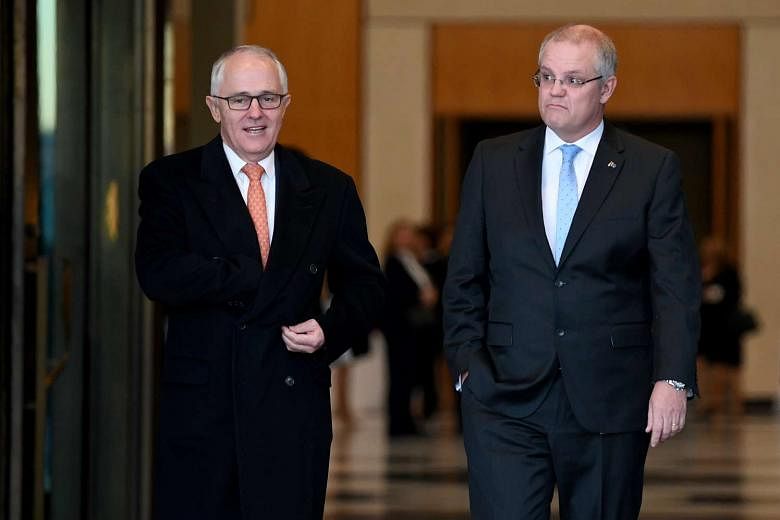SYDNEY (REUTERS) - Australian Prime Minister Malcolm Turnbull failed to win a boost in support despite delivering a conservative and well-received Budget last week, which included a popular tax on Australia's biggest banks, opinion polls showed on Monday (May 15).
Mr Turnbull remains in a precarious position, with Newspoll and Fairfax-Ipsos polls published on Monday showing he would still lose an election against the main centre-left Labor opposition.
Both polls had Mr Turnbull's conservative Liberal-National coalition six percentage points behind Labor, largely unchanged from polls before the budget.
Australia's next election is not due until 2019 but consistently poor opinion polling in Australia's rough-and-tumble political system has unseated three previous prime ministers in party-room coups in the past seven years.
"The budget didn't provide Mr Turnbull with any boost. As we get closer to an election and it becomes evident about how many seats the government will lose, there will be a push against him," said Mr Peter Chen, a senior lecturer in politics at the University of Sydney.
With consistently poor poll results, Mr Turnbull has sought to reposition his government with populist policies that satisfy sections of his coalition that lean further to the right, including making it harder for foreigners to gain work visas.
That re-positioning includes the bank tax - designed to raise A$6.2 billion (S$6.4 billion) over four years - as the centrepiece of last week's budget.
The Newspoll poll showed it was supported by two-thirds of Australian voters, even though that didn't translate into a boost for Mr Turnbull's coalition.
Mr Turnbull's popularity has waned among conservative voters, who see him as too socially liberal, and have flocked instead to far-right parties such as One Nation.
Mr Haydon Manning, a political science professor at Flinders University in South Australia state, said it appeared that Mr Turnbull was running out of ammunition.
"It is very hard now for the government to find any new policy by which they could shake voter opinion and warm to them," Mr Manning said. "It is a case now of defending what they have done."
Making matters worse, it remained unclear whether the banks - the Commonwealth Bank, Westpac, Australia and New Zealand Banking Group, National Australia Bank and Macquarie Group - would respond with a public relations campaign aimed against Mr Turnbull's government.
In 2010, mining companies unhappy over a special tax aimed at resources companies helped unseat then Labor prime minister Kevin Rudd.

